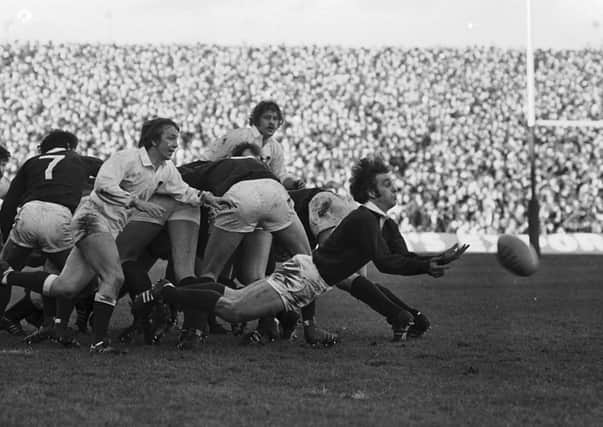Tributes paid to Dougie Morgan, one of Scottish rugby’s great servants


“Dougie Morgan had a deep understanding of the game and was tactically very aware.” A compliment, indeed, when it comes from Sir Ian McGeechan, the master tactician himself.
McGeechan yesterday led the tributes to Scottish rugby great Morgan, who died in hospital in Edinburgh on Saturday evening following a lengthy illness. He was 73.
Advertisement
Hide AdAdvertisement
Hide AdMorgan, a skilled and competitive scrum-half, didn’t just play for Scotland – he achieved the rare feat of also captaining, coaching and managing his country.
He made 21 Scotland appearances between 1973 and 1978 and contributed 71 points across an accomplished Test career. A chiropodist at the Jenners department store on Princes Street in his day job, Morgan also played two Test matches for the British and Irish Lions during the tour of New Zealand in 1977.
At club level, Morgan excelled in the colours of Stewart’s Melville, the team spawned from the merger of the FP clubs of Daniel Stewart’s and Melville College. He helped them win the Middlesex Sevens at Twickenham in 1982, converting 11 of their 12 tries at the tournament.
But it was for his performances in dark blue that Morgan will be best remembered. McGeechan, speaking to the Scottish Rugby website at the weekend, recalled the Murrayfield victories over Wales in 1973 and 1975 when the scrum-half shackled Gareth Edwards to great effect. The ’73 fixture, Morgan’s debut, saw the Scots win 10-9. Two years later, in front of a then world-record 104,000 spectators, he kicked three penalties in a 12-10 triumph.
“Dougie was a team-mate who became a very good friend during an association with Scottish rugby which covered four decades,” said McGeechan. “He was hugely competitive and a talented sportsman.
“He had a deep understanding of the game and was tactically very aware. I will never forget him standing on Gareth Edwards’ foot to distract him whilst trying to put the ball into the scrum, an approach which stopped Wales playing and we ultimately won the game. He was also a natural goal kicker.
“He was a great room-mate and always had a mug of tea waiting by the bedside in a morning. He unselfishly helped and supported others. On and off the field he was a great friend and companion. I have memories I will always cherish and be very thankful for knowing Dougie.”
There were, of course, notable defeats for Morgan too. His first match as Scotland captain came in 1978 against Ireland at Lansdowne Road and ended in a 12-9 defeat. His final cap, that same year, was a 15-0 Calcutta Cup defeat by England. On the Lions tour in 1977, he scored all the tourists’ points, including a try, but ended up on the losing side in a narrow 10-9 reverse at Eden Park.
Advertisement
Hide AdAdvertisement
Hide AdAfter hanging up his boots, Morgan moved into coaching and was part of the backroom team when McGeechan and Jim Telfer famously guided Scotland to Grand Slam victory in 1990 and then reached the semi-finals of the World Cup the following year.
“He was supremely organised, and I often used him as a sounding board when coaching,” added McGeechan. “His support was never better than with Jim Telfer, Derek Grant and myself. We had a coaching group which shared ideas, particularly in the build-up to the Rugby World Cup in 1991.”
Murrayfield chiefs promoted Morgan to head coach in the 1993-94 season and he experienced mixed fortunes in the role, which he held until the end of the 1995 World Cup and a quarter-final defeat by the All Blacks. He was in charge when a Gavin Hastings try inspired the Scots to their first victory in Paris for 26 years in ’95, 12 months after the Scots had finished rock bottom of the Five Nations standings.
Gregor Townsend famously executed a flip-pass to Hastings for that try in France 25 years ago and yesterday he warmly recalled Morgan’s input. “In 1995 we came very close to winning a Grand Slam and a few months later his Scotland team were only seconds away from topping their pool in the World Cup until France scored deep into injury time,” said Townsend, the current Scotland coach.
“Dougie was a hugely popular figure in his time as manager of the national team, someone who enjoyed having a laugh with the players, although he kept his natural competitive instinct whenever we took him on at pool or on the golf course.”
Morgan moved into team management for the final eight or so years of his career, overseeing Scotland’s Sevens team, the A side and then the senior team at the turn of the century. He called it a day after the 2003 World Cup and another quarter-final exit, this time at the hands of hosts Australia.
His interest in the sport didn’t waver, though. Morgan’s son-in-law, Graham Shiel, the Melrose player, won 18 Scotland caps and his grandson, Charlie Shiel, is the Edinburgh scrum-half and a Club XV international.
Another former Scotland coach, Richie Dixon, last night paid tribute to someone he described as “committed” and “loyal”.
Advertisement
Hide AdAdvertisement
Hide Ad“Dougie was a very committed guy. As a player, he was very astute and combative and very much a natural leader and his record for Scotland and the Lions speaks for itself,” said Dixon, who coached alongside Morgan at Scotland’s Under-21, B and senior teams. “He was very loyal to the rugby family and, most of all, his own family.
“As a coach, he was very much a thinker. I enjoyed working with him. He was just hellbent on making things good. He will be sadly missed.”
Comments
Want to join the conversation? Please or to comment on this article.